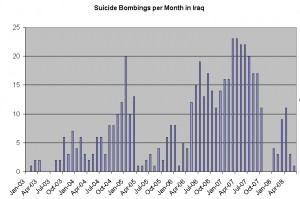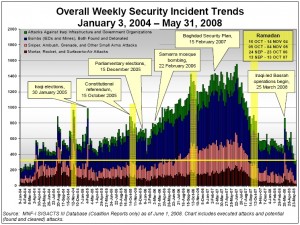The Taliban Can Be Beaten
BY Herschel SmithFirst the British were going to show the U.S. all about proper rules of engagement, proper counterinsurgency, and right conduct in a foreign country. As Basra headed downhill, the British were demoralized and talked of the “good war” in Afghanistan – the campaign that must be won. This vision has evaporated, and not just because of the talk by David Miliband and Des Brown. The support is vanishing at the grass roots level.
Britain went into Helmand two years ago on the basis of gung-ho, and gung-ho still censors public debate. Yet behind the scenes all is despair. A meeting of Afghan observers in London last week, at the launch of James Fergusson’s book on the errors of Helmand, A Million Bullets, was an echo chamber of gloom.
All hope was buried in a cascade of hypotheticals. Victory would be at hand “if only” the Afghan army were better, if the poppy crop were suppressed, the Pakistan border sealed, the Taliban leadership assassinated, corruption eradicated, hearts and minds won over. None of this is going to happen. The generals know it but the politicians dare not admit it.
Those who still support the “good” Afghan war reply to any criticism by attempting to foreclose debate. They assert that we cannot be seen to surrender to the Taliban and we have gone in so far and must “finish the job”.
This is policy in denial. Nothing will improve without the support of the Afghan government, yet that support is waning by the month. Nothing will improve without the commitment of Pakistan. Yet two weeks ago Nato bombed Pakistani troops inside their own country, losing what lingering sympathy there is for America in an enraged Islamabad. Whoever ordered the attack ought to be court-martialled, except it was probably a computer.
We forget that the objective of the Afghanistan incursion was not to build a new and democratic Afghanistan. It was to punish the Taliban for harbouring Osama Bin Laden and to prevent Afghanistan from becoming a haven for Al-Qaeda training camps. The former objective was achieved on day one; the latter would never be achieved by military occupation.
It took the U.S. Marines to pacify Garmser, and so one has to wonder at just how gung ho the Brits were, especially when a single book can cause such moribund views of the campaign. Continuing with Jenkins’ commentary:
Two things were known about the Taliban at the time and they are probably still true. First, under outside pressure their leaders were moving from the manic extremism of their “student” origins, even responding to demands to curb the poppy harvest. The present Nato policy of killing the older leaders and thus leaving young hotheads in charge is daft.
Second, the Pashtun Taliban are not natural friends of the Arab Al-Qaeda, despite Bin Laden being given sanctuary by the Taliban’s Mullah Omar. Bin Laden helped the Taliban by murdering Ahmed Shah Massoud, the Tajik leader, but that put a Tajik price on his head, which no man wants. Then the 9/11 coup made the Taliban pariahs even within the region.
Jenkins is being foolish and making things up. There is no strategy to “kill the older leaders and thus leaving young hotheads in charge.” Further, to pretend that the Taliban were or are moderating their views is worse than stolid and dense. It’s dangerous, specifically because of what Jenkins recommends.
What is sure is that Al-Qaeda, as a (grossly overrated) “threat to the West”, will not be suppressed without Taliban cooperation. This means reversing a policy that naively equates “defeating” the Taliban with “winning” the war on terror. Fighting in Afghanistan is as senseless as trying to suppress the poppy crop. It just costs lives and money.
The British view of the world has grown bizarre, or at least it has for Jenkins’ and the friends with whom he cavorts. All the Taliban really want is their piece of the pie. Drive al Qaeda and the other globalists out, they will. Only, this is daydreaming.
A more hearty view comes from inside Afghanistan from warlord-turned-military commander Gen. Abdul Rashid Dostum.
Following a traditional exchange of greetings and compliments, I asked the general to explain how the Taliban have managed to rebuild their support base and expand the insurgency.
“The Taliban are not unbeatable, and they do not field large troop formations,” he said. “They are a loose-knit group without a central organization in Afghanistan.
“The Taliban are equipped in Pakistan and sent into southern Afghanistan to wage an insurgency and to prevent reconstruction.”
When asked what was necessary to defeat the insurgents, Dostum was quick to respond.
“NATO forces must be united in their commitment to wage war against the Taliban, and they must create a unique Afghan fighting force to help them accomplish this,” he said. “The current (Afghan) national army with its current leadership will never be efficient.”
The proposed new Afghan force would be recruited from Dostum’sown former Northern Alliance fighters, numbering about 5,000, and the general believes he is the best candidate to lead this army.
“I haven’t been defeated at any stage in time,” he boasted. “I will crush the Taliban with a complete defeat in a very short time, just six months, and push them totally outside of Afghanistan’s borders.”
Then the fledgling Afghan army would have the breathing space it needs to develop into a professional fighting force, he said.
The Northern Alliance, recall, is the group that forced the Taliban out with a slight bit of help from the U.S. After this, we felt it necessary to enter into all manner of shady deals with Taliban-sympathizers rather than deploy forces to the theater, and thus the campaign has steadily gone downhill since (with steadily worsening security).
Rather than being the answer to the malaise in the campaign, making shady deals with Taliban and their sympathizers is what has gotten the campaign where it is today. While it may be a most delightful daydream to imagine that we can simply leave the theater to good men who will drive out the extremists, the problem is that the men we will leave the theater to are the extremists.






